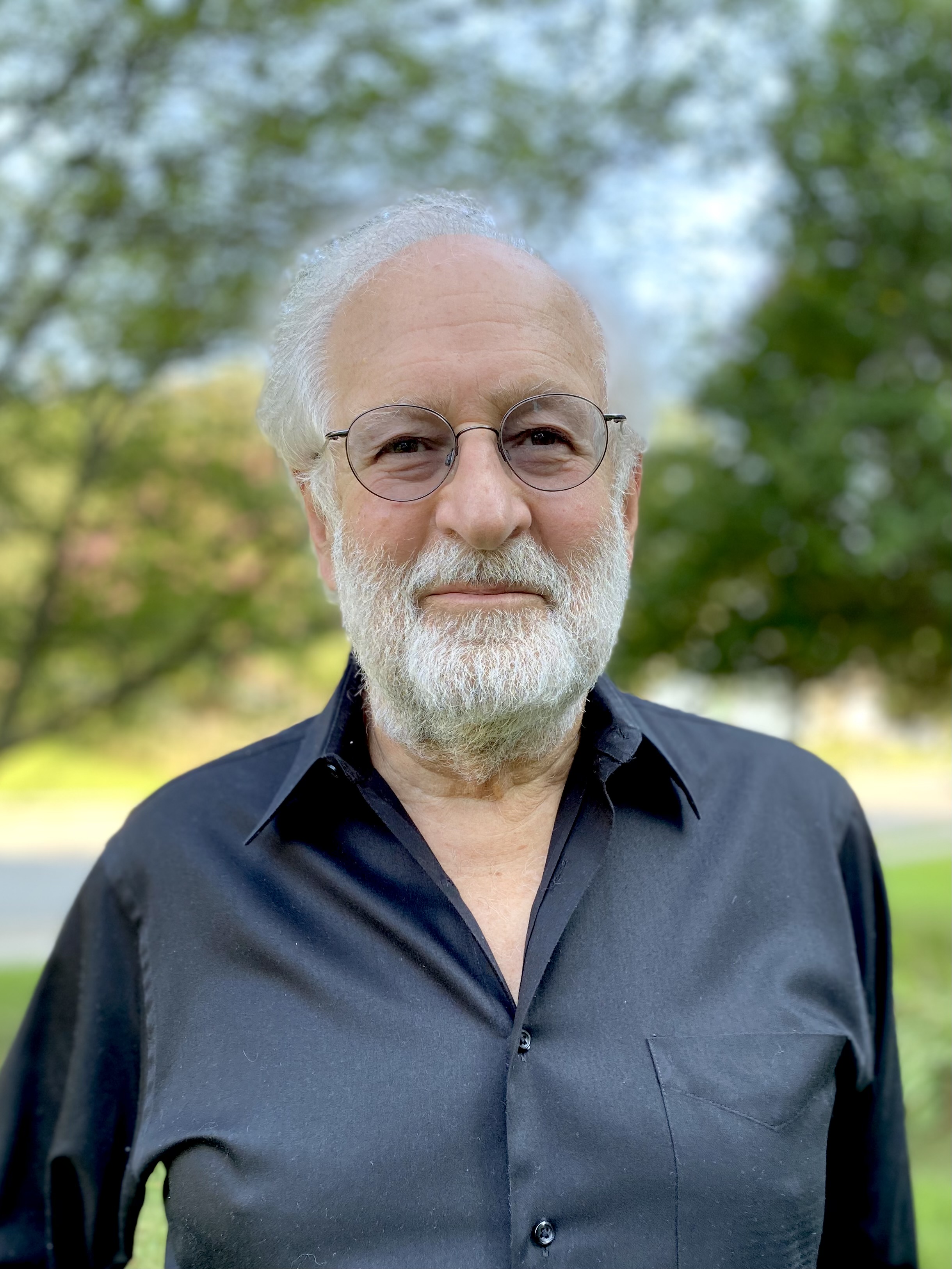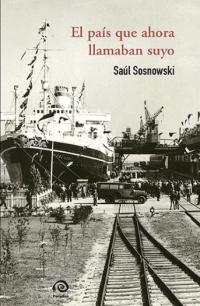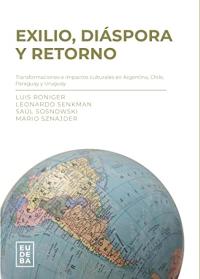Saúl Sosnowski

School of Languages, Literatures, and Cultures
Professor, Spanish and Portuguese
Affiliate Faculty, Latin American and Caribbean Studies Center
4202 Jiménez Hall
Get Directions
Research Expertise
Diaspora
Identity Narratives
Latin America
Politics of Latin America
Saúl Sosnowski (Buenos Aires, 1945) holds a Ph.D. from the University of Virginia and directed the Institute for International Programs from 2000 until 2011. A professor of Latin American Literature and Culture at the University of Maryland at College Park, he has chaired the Department of Spanish and Portuguese (1979-2000) and was Director of the Latin American Studies Center (1989-2009), which he founded in 1989. He has held visiting appointments in the U.S. and overseas, including as “Lady Davis Visiting Professor” at The Hebrew University of Jerusalem, and as “Walter Mangold Visiting Scholar” at the University of Melbourne. Author of Julio Cortázar: una búsqueda mítica; Borges y la Cábala: la búsqueda del Verbo (currently in its third edition; translated into Portuguese and German); La orilla inminente: escritores judíos-argentinos, Fascismo y nazismo en las letras argentinas (with Leonardo Senkman); Cartografía de las letras hispanoamericanas: tejidos de la memoria; over 90 articles; editor or co-editor of 17 volumes. Founder and Editor of the literary journal Hispamérica, currently in its 47th. year of continuous publication, he also serves on the boards of five scholarly journals. Borges y la Cábala: senderos del Verbo, with Argentine artist Mirta Kupferminc (Buenos Aires, Artes Gráficas, 2006) led to major exhibitions at Centro Cultural Recoleta (Buenos Aires), The Art Gallery at the University of Maryland, Centro da Cultura Judaica (São Paulo), and numerous presentations in the US and Israel. He co-directed two National Endowment for the Humanities institutes in México and Brazil. At Maryland he directed the multi-year "Discovering the Americas" program (1987-1993). He obtained funding from the Rockefeller Foundation for Resident Fellowships (1988-1994), as well as additional institutional and individual research support from, among others, SSRC, ACLS, Fulbright, Rockefeller, USIA, and the U.S. Department of Education. Over the years he served on advisory boards for National Public Radio and the JCLAS (SSRC-ACLS), as a member on NEH, DIES, and ACLS panels, and on several literary and cultural award committees. He directed a decade-long series of international conferences on "The Repression of Culture and its Reconstruction in the Southern Cone" (1984-1994). These conferences resulted in five edited or co-edited volumes published in Buenos Aires, Montevideo, São Paulo, Santiago, and Asunción. In 1995 he launched the project “A Culture for Democracy in Latin America,” and in March 2001, in Buenos Aires, “New Leadership for a Democratic Society.” In addition to lectures and programs on literature, his lectures and publications for over a decade have centered on issues of civic education, democracy, conflict management and cultural politics with a focus on Latin America. Related publications include: Una cultura para la democracia en América Latina (México, 1999, co-edited with Roxana Patiño), Economía de la cultura: Mecenazgo (Buenos Aires, 1999), and he co-edited, with José Alvaro Moisés, of Brazil's Ministry of Culture, the three volumes that resulted from the joint University of Maryland-Ministerio da Cultura, Brazil, "A Culture for Democracy in Brazil," Cultura e Democracia (Rio de Janeiro, 2001-2002). His most recent publication, the result of a team-research project, funded by the U.S.-Israel Binational Science Foundation, is Exile, Diaspora, end Return. Changing Cultural Landscapes in Argentina, Chile, Paraguay, and Uruguay (with Luis Roniger, Leonardo Senkman and Mario Sznajder). His courses included seminars on Borges, Cortázar, issues linked to literature, politics, exile and democracy.
Publications
Exilio, diáspora y retorno
Transformaciones e impactos culturales en Argentina, Chile, Paraguay y Uruguay
Contributor(s): Saúl SosnowskiNon-ARHU Contributor(s): Luis Roniger (Author), Leonardo Senkman (Author), Mario Sznajder (Author)
During the late twentieth and early twenty-first centuries, dictatorships in Latin America hastened the outward movement of intellectuals, academics, artists, and political and social activists to other countries. Following the coups that toppled democratically elected governments or curtailed parliamentary oversight, the incoming military or civilian-military administrations assumed that, by forcing those aligned with opposition movements out of the country, they would assure their control of politics and domestic public spheres. Yet, by enlarging a diaspora of co-nationals, the authoritarian rulers merely extrapolated internal dissent and conflicts, emboldening opposition forces beyond their national borders. Displaced individuals soon had a presence in many host countries, gaining the support of solidarity circles and advocacy networks that condemned authoritarianism and worked with exiles and internal resistance towards the restoration of electoral democracy. Exiles soon became vehicles for spreading cultural ideas from abroad, celebrating cosmopolitanism over nationalism, and emphasizing human rights and democracy in Latin American countries.
Exile, Diaspora, and Return explores how Argentina, Chile, Paraguay, and Uruguay have been affected by post-exilic relocations, transnational migrant displacements, and diasporas. Specifically, this book provides the first comprehensive analysis of diasporic experiences and the impact of returnees on the public life, culture, institutions, and development of post-authoritarian politics in the Southern Cone of the Americas. Bringing together sociopolitical, cultural, and policy analysis with the testimonies of dozens of intellectuals, academics, political activists, and policy makers, the authors address the impact of exile on people's lives and on their fractured experiences; the debates and prospects of return; the challenges of dis-exile and post-exilic trends; and the ways in which those who experienced exile impacted democratized institutions, public culture, and discourse. Furthermore, the authors present new readings of the recent history of South America and the diasporas that emphasize the importance of regional, transnational or global dimensions over the national.
---
Este libro estudia, desde el análisis de las trayectorias personales y la inserción institucional, cómo Argentina, Chile, Paraguay y Uruguay se vieron afectados por las experiencias del exilio y el posexilio. Se intenta revelar cómo la variada experiencia transnacional de aquellos intelectuales, académicos, artistas, profesionales y activistas políticos y sociales contribuyó, durante y luego del destierro, a democratizar el campo cultural y a renovar algunas de las ideas e instituciones de estas sociedades. El exilio y el destierro son algunos de los legados del autoritarismo en estos países; se trató de un proceso que incluyó proscripción, desplazamientos forzados, expatriaciones y diásporas emergentes. Por medio del análisis de estas sociedades se pretende reconocer, describir y descifrar sus diferentes caminos en el período posdictatorial.
Muchos de los desplazados tenían un capital social y cultural previo que experimentó diversos cambios personales y organizativos a medida que se adaptaban a los diversos ámbitos culturales, lingüísticos, sociales y políticos de los países anfitriones. El retorno no es el resultado “natural” del fin de las dictaduras, sino que fue una –solo una– de las opciones para parte de los desplazados, y constituye un fenómeno complejo y multifacético. Las sociedades en general no siempre acogían de buen grado a los retornados y a sus familias. Surgían discusiones acerca del sufrimiento relativo de los que se quedaron frente al padecer de los que se fueron. Dada la falta de alternativas, el regreso fue parcial y prolongado. Las cuatro sociedades han experimentado un cambio radical al reconocer la importancia de los connacionales en la diáspora. La obra ha sido galardonada con el Premio Arthur Whitaker del 2022, otorgado por el Mid-Atlantic Council of Latin American Studies del 2022 al mejor libro de temática latinoamericana.

Es un doble placer: el leer la historia de cómo se enseña y cómo se aprende a ocupar el mundo, y el saber de pronto que esta historia es la traducción –quizás fiel, quizás no, y qué triple placer que no lo fuera– de una narración que se contó desde hace mucho, desde hace poco, en una lengua que es un reto a toda identidad y que es la identidad de la espera y la esperanza.
Walter Benjamin dijo de unas traducciones del griego al alemán hechas por Hölderlin que la armonía entre los dos lenguajes era tan profunda que las palabras tocaban sus significados así como el viento toca un arpa eólica. Saúl Sosnowski ha logrado en este texto la misma proeza: así como el viento toca las cuerdas, aquí el idish toca el español creando una armonía donde se reconoce al espíritu nómada, en la que se enfrenta sin miedo a la barbarie antisemita, donde se recogen los hilos más secretos de la humanidad, en la que se escucha la capacidad de nombrar y de ocupar el nombre, y también cómo se siembra, cómo se cultiva, cómo se derrota al tiempo. Y cómo se ama el amor.
El país que ahora llamaban suyo es la traducción perfecta: narración que sustituye a la original dejando intacta su autoridad fundacional; así como el nuevo país es propio sin borrar el menor detalle de la geografía de aquél que viene de ese otro lado. Doble placer ofrece este relato: reconocer lo invisible, olvidar lo inolvidable. Placer único: aquí, en este libro, con cada palabra el otro aparece en mí.
Jorge Aguilar Mora


